

Kriminologie. The Criminology Mega-Site.
Kriminologie-Lexikon ONLINE. Famous Trials - UMKC School of Law - Prof. Douglas Linder. Links zu kriminologischen Ressourcen (copy 1) Krimpedia:Hauptseite – Krimpedia. Links — Juristische Fakultät. Auf dieser Seite werden unserer Meinung nach bemerkenswerte Links mit dem Schwerpunkt Kriminologie vorgestellt: Inhaltsverzeichnis / Contents: Institutionen und Organisationen / Institutions and Organizations Deutschland, Österreich, Schweiz / Germany, Austria, Switzerland Deutschland / Germany Österreich / Austria Schweiz / Switzerland Weitere Europäische Länder / Other European Countries Belgien / Belgium Frankreich / France Georgien / Georgia.

Sekundärliteratur: Kriminologie - TourLiteratur. Correlates of crime. Many different correlates of crime have been proposed with varying degrees of empirical support.
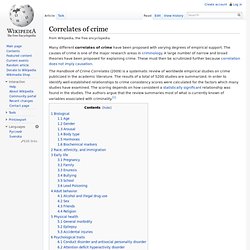
The causes of crime is one of the major research areas in criminology. A large number of narrow and broad theories have been proposed for explaining crime. These must then be scrutinized further because correlation does not imply causation. Sociology of law. The sociology of law (or legal sociology) is often described as a sub-discipline of sociology or an interdisciplinary approach within legal studies.[1] Some see sociology of law as belonging "necessarily" to the field of sociology[2] whilst others tend to consider it a field of research caught up between the disciplines of law and sociology.[3] Still others regard it neither as a sub-discipline of sociology nor as a branch of legal studies but as a field of research on its own right within the broader social science tradition.
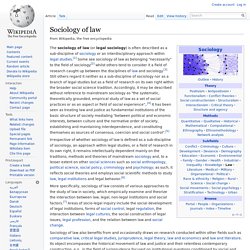
Sociology of law also benefits from and occasionally draws on research conducted within other fields such as comparative law, critical legal studies, jurisprudence, legal theory, law and economics and law and literature. Intellectual origins[edit] Victimology. Victimology is the study of victimization, including the relationships between victims and offenders, the interactions between victims and the criminal justice system — that is, the police and courts, and corrections officials — and the connections between victims and other social groups and institutions, such as the media, businesses, and social movements.[1] Victimology is however not restricted to the study of victims of crime alone but may include other forms of human rights violations.
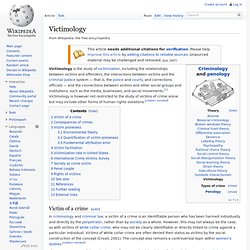
[citation needed] Victim of a crime[edit] In criminology and criminal law, a victim of a crime is an identifiable person who has been harmed individually and directly by the perpetrator, rather than by society as a whole. However, this may not always be the case, as with victims of white collar crime, who may not be clearly identifiable or directly linked to crime against a particular individual.
Penology. Penology (from the Latin poena, "punishment" and the Greek suffix -logia, "study of") is a section of criminology that deals with the philosophy and practice[1][2][3] of various societies in their attempts to repress criminal activities, and satisfy public opinion via an appropriate treatment regime for persons convicted of criminal offences.
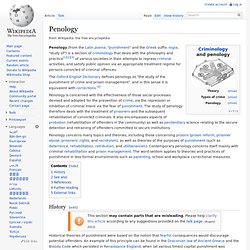
The Oxford English Dictionary defines penology as "the study of the punishment of crime and prison management", and in this sense it is equivalent with corrections.[4] Penology is concerned with the effectiveness of those social processes devised and adopted for the prevention of crime, via the repression or inhibition of criminal intent via the fear of punishment. The study of penology therefore deals with the treatment of prisoners and the subsequent rehabilitation of convicted criminals. History[edit] See also[edit] Anthropological criminology. History[edit] The physiognomist Johann Kaspar Lavater (1741–1801) was one of the first to suggest a link between facial figures and crime.[1] Victor Hugo referred to his work in Les Misérables, about what he would have said about Thénardier's face.
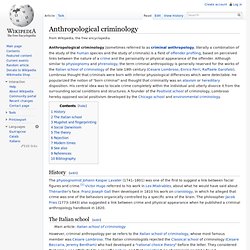
Franz Joseph Gall then developed in 1810 his work on craniology, in which he alleged that crime was one of the behaviors organically controlled by a specific area of the brain. The philosopher Jacob Fries (1773–1843) also suggested a link between crime and physical appearance when he published a criminal anthropology handbook in 1820. The Italian school[edit] Deviance (sociology) Norms are rules and expectations by which members of society are conventionally guided.
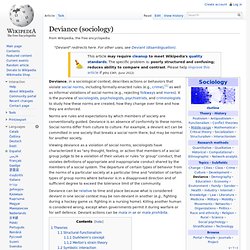
Deviance is an absence of conformity to these norms. Social norms differ from culture to culture. For example, a deviant act can be committed in one society that breaks a social norm there, but may be normal for another society. Viewing deviance as a violation of social norms, sociologists have characterized it as "any thought, feeling, or action that members of a social group judge to be a violation of their values or rules "or group" conduct, that violates definitions of appropriate and inappropriate conduct shared by the members of a social system.
International Crime Victims Survey. Why victims surveys[edit] Reliable Crime statistics are hard to come by.

Crimes recorded by the police and other authorities are a main source of information but have their limitations, these limitations are discussed in the Crime statistics article. An alternative is a victimisation survey (or victim study) in which a random sample of the population is asked about their experiences with crime and victimisation. Many countries have such surveys. They give a much better account for the volume crimes but are less accurate for crimes that occur with a (relative) low frequency such as homicide, or victimless 'crimes' such as drug (ab)use. International comparison[edit] Attempts to use the data from these national surveys for international comparison have failed.
To date[edit] More than 70 countries have participated at least once over the years. Cesare Lombroso. Cesare Lombroso (born Ezechia Marco Lombroso; Italian: [ˈtʃɛzare lombˈroso]; 6 November 1835 – 19 October 1909), was an Italian criminologist, physician, and founder of the Italian School of Positivist Criminology.
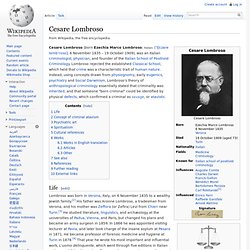
Lombroso rejected the established Classical School, which held that crime was a characteristic trait of human nature. Instead, using concepts drawn from physiognomy, early eugenics, psychiatry and Social Darwinism, Lombroso's theory of anthropological criminology essentially stated that criminality was inherited, and that someone "born criminal" could be identified by physical defects, which confirmed a criminal as savage, or atavistic. Concentric zone model. Concentric zone model Commuter zone Residential zone Working class zone Factory zone.
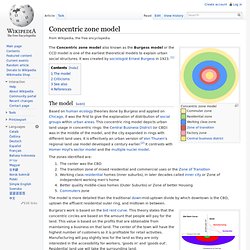
Biosocial criminology. Biosocial criminology is an interdisciplinary field that aims to explain crime and antisocial behavior by exploring both biological factors and environmental factors. While contemporary criminology has been dominated by sociological theories, biosocial criminology also recognizes the potential contributions of fields such as genetics, neuropsychology, and evolutionary psychology.[1] Approaches[edit] Chicago school (sociology) In sociology and later criminology, the Chicago School (sometimes described as the Ecological School) was the first major body of works emerging during the 1920s and 1930s specialising in urban sociology, and the research into the urban environment by combining theory and ethnographic fieldwork in Chicago, now applied elsewhere.
Differential association. In criminology, Differential Association is a theory developed by Edwin Sutherland proposing that through interaction with others, individuals learn the values, attitudes, techniques, and motives for criminal behavior. Differential association predicts that an individual will choose the criminal path when the balance of definitions for law-breaking exceeds those for law-abiding. This tendency will be reinforced if social association provides active people in the person's life. Earlier in life the individual comes under the influence of those of high status within that group, the more likely the individual to follow in their footsteps. This does not deny that there may be practical motives for crime.
If a person is hungry but has no money, there is a temptations to steal. Italian school of criminology. Positivist school. In criminology, the Positivist School has attempted to find scientific objectivity for the measurement and quantification of criminal behavior. As the scientific method became the major paradigm in the search for all knowledge, the Classical School's social philosophy was replaced by the quest for scientific laws that would be discovered by experts.
It is divided into Biological, Psychological and Social.